Successful State Programs for Renewable Energy on Contaminated Sites
Sponsored by: EPA's RE-Powering America's Land Initiative
Why do some states have more of their solar generation on contaminated sites, while other states are at much lower levels? This webinar will explain one of the biggest factors -- the successes of state renewable programs specifically designed for prioritizing landfills, mine sites, and other potentially contaminated lands.
States such as New Jersey, Massachusetts, and Illinois have large-scale programs in place that are leading to the successful development of many megawatts of new renewable projects on RE-Powering sites per year. The state programs include financial incentives, procurement preferences, streamlined permitting, liability relief, and hands-on project development assistance designed and implemented by states over a decade or more.
Drawing on its national best practice research and profiles of more than five dozen programs across more than a dozen states, EPA's RE-Powering America's Land Initiative is hosting the webinar to help you learn about common types of successful state programs, their impacts, and implementation tips. This topic is timely because many states, as well as local communities, are considering how to expand contaminated site reuse as part of their greenhouse gas reduction plans and how to preserve agricultural lands and other greenfield sites.
To share on-the-ground knowledge, a panel of renewable developers focused on contaminated sites will describe how they have participated in state programs and how those programs have reduced the risks, improved the speed, and lowered the costs of their renewable energy projects on contaminated sites. The webinar will also describe new, free resources - including individual program profiles - where participants can learn much more on the topic.
ICYMI - In a previous webinar, RE-Powering America's Land Initiative featured a panel with agency staff from three leading states who discuss how they have created and managed successful programs. Watch the recorded webinar here: January 2022, Unlocking Brightfields Potential: State Programs to Encourage Renewable Energy Siting on Contaminated Lands - RE-Powering America's Land Initiative.
 Paul Curran, Chief Development Officer, CleanCapital
Paul Curran, Chief Development Officer, CleanCapital
Paul Curran is the Chief Development Officer at CleanCapital, a diversified clean energy company, and was previously the CEO and founder of BQ Energy (BQE), which was acquired by CleanCapital in 2022. Curran founded BQE 20 years ago, where he became the first fulltime developer of renewable energy projects on landfill and brownfield. He is passionate about working with lower and middle-income communities (LMI) to develop renewable energy projects on polluted sites.
 Kyle Miller, AC Power
Kyle Miller, AC Power
Kyle Miller is currently serving as the Chief Strategy Officer at AC Power, a prominent brownfield solar developer. With a wealth of experience and expertise, Kyle has played a pivotal role in the development of community solar projects, particularly in the states of New Jersey and New York.
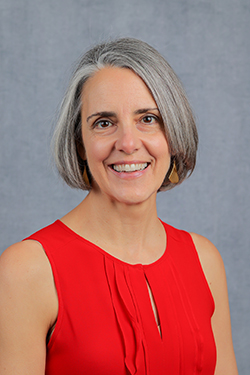 Lora Strine, Team Leader, RE-Powering America's Land Initiative, U.S. EPA (strine.lora@epa.gov)
Lora Strine, Team Leader, RE-Powering America's Land Initiative, U.S. EPA (strine.lora@epa.gov)
Lora Strine is team leader for EPA's RE-Powering America's Land Initiative. She has twenty years of experience in the energy and environment field. Ms. Strine coordinates the promotion and development of resources to help communities redevelop contaminated lands with renewable energy.
Moderator:
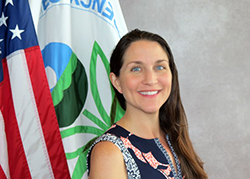 Jean Balent, U.S. EPA Technology Innovation and Field Services Division (balent.jean@epa.gov or 202-566-0832)
Jean Balent, U.S. EPA Technology Innovation and Field Services Division (balent.jean@epa.gov or 202-566-0832)
Ms Balent is on the staff of the EPA's Technology Innovation and Field Services Division where she has worked to collect and disseminate hazardous waste remediation and characterization information since 2003. Ms Balent manages the Clean Up Information Network website and actively supports online communication and collaboration resources available to EPA. She formerly worked with the US Army Corps of Engineers Environmental Engineering Division in the Buffalo District. Ms Balent was also a member of the SUNY-Buffalo Groundwater Research Group where she constructed and tested large scale models of groundwater flow. Ms Balent has also conducted research relating to the Great Lakes, environmental remediation, and brownfields re-development. She holds a Bachelor's degree in environmental engineering from SUNY-Buffalo and a Master's degree in Information Technology from AIU.
Webinar Slides and References:
-
 Slide Presentation for Curran - Brownfield and Landfill Investment (3.10MB/PDF)
Slide Presentation for Curran - Brownfield and Landfill Investment (3.10MB/PDF)
-
 Slide Presentation for Miller - EPA Successful State Programs Webinar - AC Power (2.00MB/PDF)
Slide Presentation for Miller - EPA Successful State Programs Webinar - AC Power (2.00MB/PDF)
Additional Resources:
- EPA RE-Powering Initiative
- EPA's resources on state policies
- State Program Selection & Design Tips for Renewable Energy on Potentially Contaminated Sites
- Thumbnail Descriptions of State Policies Supporting Renewable Energy Development on Landfills, Mines, and Formerly Contaminated Sites
- In-Depth Profiles of Programs in Six States for Renewable Energy Development on Landfills, Mines, and Formerly Contaminated Sites
- Summary of "RE-Powering" State Programs for the Reuse of Virginia Landfills & Brownfields for Solar
- Summary of State Programs for the Reuse of Brownfields, Landfills, and Former Mines for Renewable Energy in Michigan
Thank you for participating in our webinar. We would like to receive any feedback you might have that would make this service more valuable.
Help & FAQs
- Frequently Asked Questions
- Content Questions?
Call Lora Strine at 202-564-1521 or strine.lora@epa.gov - Technical Problems?
Leave us a comment - Cancel Your Registration
- My Participation Records
- CEU Credits and PDHs
Zoom Resources
Before Webinar Day
This seminar will be delivered through Zoom. Participants are encouraged to update to the latest version of the Zoom application for the best experience.
If you are unable to install the Zoom application, most functions will be available if you join just using a modern web browser such as Chrome, Edge or Firefox. We strongly encourage you to run the Zoom Meeting Test prior to attending this webinar. Technical support on the day of the webinar will be very limited and subject to significant delays.
Backup Conference Call
If you cannot participate using online audio, you may join the optional call in line. After checking in for the live event using the instructions listed below, you will see several options to participate. Please click the links in option 4 to follow along by phone and obtain the call in number. If you cannot access the phone number, you may request the call in line from the event moderator in the Q&A or send an email to Jean Balent at balent.jean@epa.gov
Click on "Join Webinar" at the top of this screen, enter your exact first and last name as you registered and enter the number of people attending at your location (including yourself). You should then be taken to the Zoom meeting room. Join with Zoom Application: For those joining with the Zoom application, you may be prompted to sign with a zoom account or join as a guest without signing in.
If joining as a guest, you will be prompted to enter your name and email address. Remember your name, image, video or voice may be visible to others in the live event. When done, click "Join" When it is time for the live event to start, the meeting host will admit you to the live Zoom meeting. Join via web browser (without the Zoom Application): For those joining with a web browser, you may close any pop ups prompting you to download the Zoom app. The next window will allow you to enter your name (first name and last name) and check the box that you are not a robot. Click the blue join button. You may also be asked to provide your email address before joining the room. Remember your name, image, video or voice may be visible to others in the live event. When done, click "Join" When it is time for the live event to start, the meeting host will admit you to the live Zoom meeting. You may need to periodically refresh the browser window to confirm if the host has admitted you. The presenters will control what slide you are viewing. You may submit questions online for the instructors to answer during the webinar by typing in the "Q&A" area. It is not necessary to wait until the question and answer periods to submit questions. At the end of the webinar you will be guided to our feedback form and links to additional resources, including the complete presentation. These links will remain active after the webinar. Provided for your convenience. Importing or accepting the invitation within this iCalendar file is not required, and declining the invitation does not cancel your registration. For additional information on iCalendar, please see our
iCalendar Help
Webinar Day, Checking In
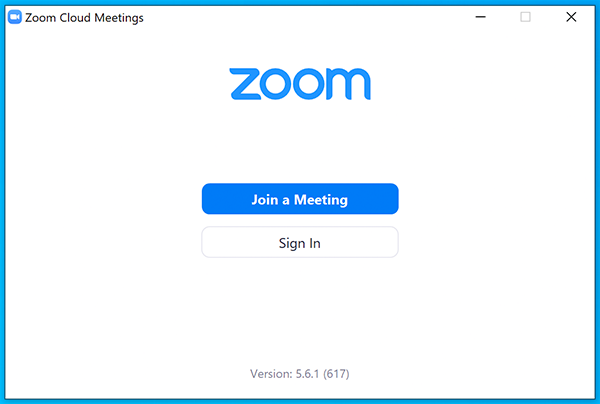
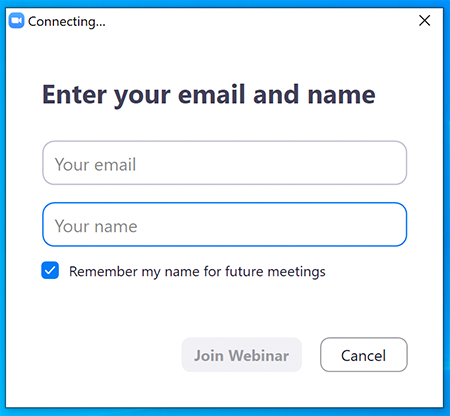
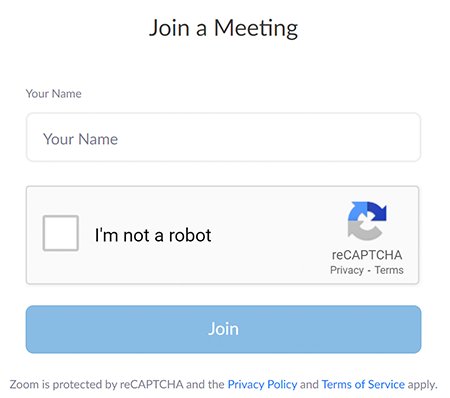
Moving Through Slides
Feedback & Links to Additional Resources
iCalendar File
Rehabilitation Act Notice for Reasonable Accommodation
It is EPA's policy to make reasonable accommodation to persons with disabilities wishing to participate in the agency's programs and activities, pursuant to the Rehabilitation Act of 1973, 29 U.S.C. 791. Any request for accommodation should be made to at or , preferably one week or more in advance of the webinar, so that EPA will have sufficient time to process the request. EPA would welcome specific recommendations from requestors specifying the nature or type of accommodation needed. EPA welcomes specific recommendations from requestors specifying the nature or type of accommodation needed. Please note that CLU-IN provides both alternate phone call-in options and closed captioning for all webinars, and requests for these specific accommodations are not necessary.
Webinar Recording
By participating in this CLU-IN webinar, you automatically agree to authorize recording of audio and visual content presented during this live event and consent to subsequent use of this recording in the public domain by the U.S. Environmental Protection Agency. This recording may include questions, comments and poll responses provided by you during the live event in addition to your name, voice, image or likeness. This recording will be made available after the conclusion of the live event as part of the CLU-IN webinar archives, and will remain available indefinitely. If you do not wish to consent to the recording, please do not join the live event, and contact Jean Balent at 202-566-0832 or balent.jean@epa.gov to discuss your concerns.
Content Disclaimer
This webinar is intended solely to provide information to the public. The views and opinions expressed as part of this webinar do not necessarily state or reflect those of the U.S. Environmental Protection Agency. It is not intended, nor can it be relied upon, to create any rights enforceable by any party in litigation with the United States, or to endorse the use of products or services provided by specific vendors. With respect to this webinar, neither the United States Government nor any of their employees, makes any warranty, express or implied, including the warranties of merchantability and fitness for a particular purpose, or assumes any legal liability or responsibility for the accuracy, completeness, or usefulness of any information, apparatus, product, or process disclosed, or represents that its use would not infringe privately owned rights.

